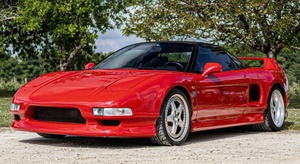As a former automotive magazine publisher/editor myself (in fact, this very publication you're reading grew out of the DNA of my publication, British Car Magazine, when Tim Suddard purchased it many years ago from the fellow who purchased it from me), I took countless thousands of exposures over the years in the pre-digital age. Mostly 35mm print, color and B&W, as well as medium format 2-1/4 and also 4x5 stuff. Digital was still years away when I sold the magazine.
I can tell you that lugging a kit bag with a Canon F1 body, motor drive, a selection of lenses the density and weight of GM Powerglides, bags of filters, light meters, tripod, and many and sundry other necessities gave one that simian droop to one side. It was like driving a vintage car cross-country, with a trunkful of belts and hoses and other spares, bottles and cans of fluids, jumper cables, bottle jack, flares, and if there was still room, more of the same.
After my publishing days came to an end, I sold my well-patinaed Canon F1 equipment (reluctantly, as I'd shouldered those old SLRs all over the world—like old friends—but their value was plummeting by the minute). But while I was still in the film world, I'd gotten interested in vintage cameras, and compiled a collection of roughly 250 film cameras, ranging from late 1800s (with a couple of glass plate devices in the mix) up to the late Sixties. I had—and still have—folding cameras from the late 19th/early 20 centuries, all manner of range finders and some SLRs too.
I collected almost the entire range of American-made Argus 35mm rangefinders (and taught my kids photography basics on these "bricks"), as well as Leicas from the 1920s, Zeiss-Ikon, Contax, etc. I used these primitive devices at car shows and other events and many of the images in my publication were made with cameras as old as—or older—than the cars or bikes themselves.
The German Leica range is well-known, but its compatriot Exakta—an early SLR—is every bit the match for Leica, in my opinion, and has as vast a range of lenses and accessories as does Leica. I'd recommend either of these compact cameras (some of the Leica lenses actually retract so you can carry the camera in your pocket) for shooting classic cars and other subjects on interest. The Zeiss lenses are superb and give an almost organic quality to the exposures.
The point here is not the expediency or ease with which to capture the optimal image, such as is possible for the "lazy" digital photographer—not inferring all digital lensmen are lazy or that their craft lacks finesse and merit—but to capture the finest image you can in a more deliberate, contemplative process. You only have so many exposure on a roll with which to work. So composition, lighting, exposure, shutter speed, etc., all become far more critical and require the sort of intimate involvement with the machine as does hustling along a sinewy roadcourse at speed in a vintage sports car, matching engine and mainshaft speeds in a perfect, seamless double-declutched downshift, feathering in the throttle to control drift on narrow, bias tires, and grinning broadly when being passed on the straight by a guy in a modern XYZ1000 SuperDuper, paddle-shifting his 800 hp computer-controlled missile. But you're having way more fun.
Sort of like picking up your packet of prints from the photo lab to see what you got on that last roll...




























